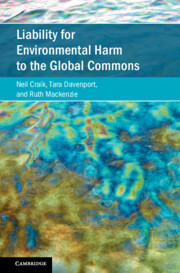Acknowledgements
This book has its origins in a research project examining dimensions of liability arising from deep seabed mining activities in the Area, that is, the seabed and ocean floor and subsoil beyond the limits of national jurisdiction which was developed in 2017 by the Centre for International Governance Innovation (CIGI), the Commonwealth Secretariat and the Secretariat of the International Seabed Authority (ISA). To carry out this project legal experts were invited to form the Legal Working Group on Liability for Environmental Harm from Activities in the Area (LWG). We were fortunate enough to be part of the LWG and we benefitted tremendously from the discussions and insights of the other members of the LWG. The other members of the LWG (and their affiliations at the time the project was undertaken) were as follows:
Alfonso Ascencio-Herrera, Deputy Secretary-General, ISA
Christopher Brown, Legal Officer, ISA
Eden Charles, Independent Consultant on International Law, and Former Ambassador, Trinidad and Tobago
Elie Jarmarche, Special Advisor on the Law of the Sea, and Member of the Legal and Technical Commission, ISA
Hannah Lily, Legal Advisor, Commonwealth Secretariat
Stephen Roady, Professor of the Practice of Law, Duke University School of Law
Andrés Sebastián Rojas, Ministry of Foreign Affairs and Worship, Argentina
Dire Tladi, Professor of Law, University of Pretoria, and Member, International Law Commission
Guifang (Julia) Xue, Professor, KoGuan Law, Shanghai Jiao Tong University.
In addition to our colleagues on the LWG, we are particularly grateful to the three partner organizations for their financial and logistical support of the activities of the LWG. The work of the LWG was presented in a series of reports published by CIGI in 2018,Footnote 1 and has been further developed in a subsequent publication that draws on the work of the LWG.Footnote 2
The research and ideas contained in this book were presented at workshops and seminars at the Lauterpacht Centre for International Law, University of Cambridge; and the University of New South Wales Law School. We are grateful to the participants for their insights and interest in this project. All views, errors and omissions in the book are attributable to the authors only.
Neil Craik’s work on this book was generously supported by the Social Sciences and Humanities Research Council of Canada through an Insight Grant (‘The International Law of the Global Commons: Towards a Global Constitutional Framework’), as well as through support provided by CIGI through a Senior Fellowship. Tara Davenport’s work was supported by the Faculty of Law at the National University of Singapore (NUS) and in particular the research institutes, the Asia-Pacific Centre for Environmental Law and the Centre for International Law. Ruth Mackenzie’s work was supported by Westminster Law School.
Our research for this book and our preparation of the manuscript benefitted greatly from the work of a number of student research assistants. We are grateful to Kristine Gu (University of Calgary Law School); and Sebastian Aguirre, Lee Wei Ting, Ashley Teo, Tiwana Manamol, Gracia Goh, Joy Chen and Jiang Zhifeng (National University of Singapore).
The preparation of this book was greatly impacted by the global pandemic, which affected our professional and personal lives in many ways. We owe a huge debt of gratitude to Matt Galloway of Cambridge University Press for his steadfast perseverance and patience in the face of numerous delays in completing the manuscript. Thank you, as well, to Jadyn Fauconnier-Herry and the production staff at Cambridge University Press.
We are all especially grateful to our family and friends who provided support, encouragement and much appreciated (at least in hindsight) distractions, as we worked to complete this book. Neil is particularly thankful to Janet, his wife, for trying (with marginal success) to get him to work less, and his parents, Fergus and Anne, who politely stopped asking when this book might be completed. Ruth expresses special thanks to Sylvia Mackenzie for her spirit, humour and constant support. Tara thanks Paul, Kaiden, Talia and Avana for their unwavering patience and constant support.
1 The work of the LWG is summarized in Neil Craik and others, ‘Liability for Environmental Harm: Synthesis and Overview’ CIGI, Liability Issues for Deep Seabed Mining Series Paper No 1, 13 July 2018. The complete set of papers of the LWG can be found online: <www.cigionline.org/series/liability-issues-deep-seabed-mining-series>.
2 Neil Craik, ‘Liability for Environmental Harm from Deep Seabed Mining: Towards a Hybrid Approach’ (2019) 33 Ocean Yearbook 315–338.

